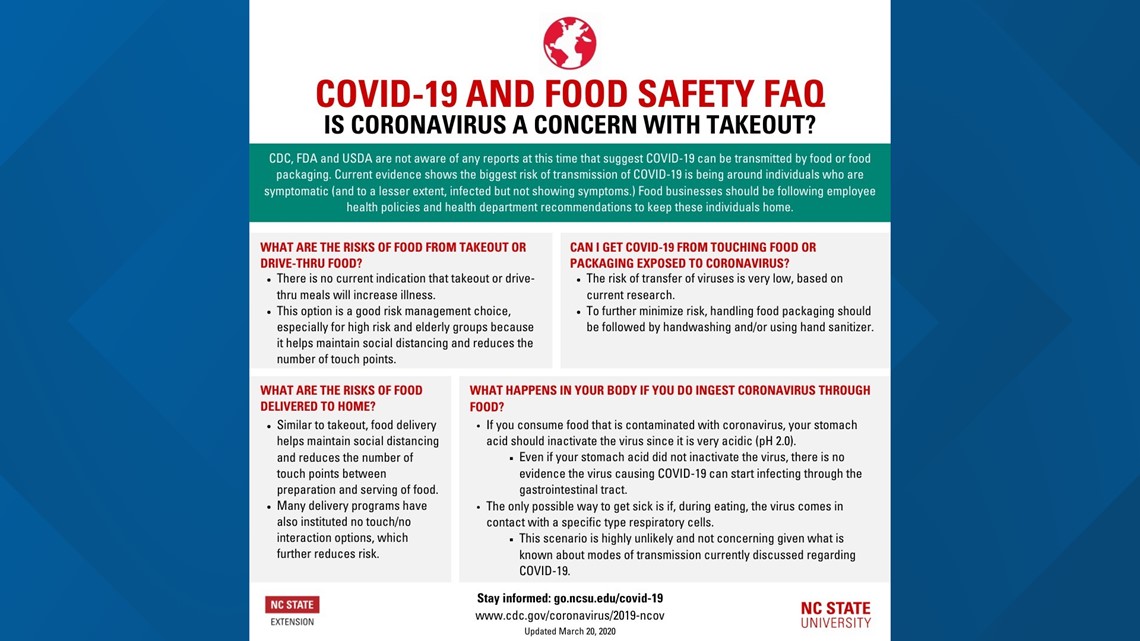GREENSBORO, N.C. — After North Carolina bars and restaurants were ordered to close dining rooms last week, we’re all forced to get used to this new norm of takeout. Many of you asked if takeout and drive-thru dining is safe. Well, we’ve got answers.
The CDC, FDA and USDA say it is “not aware of any reports at this time that suggest COVID-19 can be transmitted by food or food packaging.” As long as restaurants and businesses are following health policies, there should not be a problem ordering takeout.
YOUR QUESTIONS ANSWERED
Q: WHAT ARE THE RISKS OF FOOD FROM TAKEOUT OR DRIVE-THRU FOOD?
A: There is no current indication that takeout or drive-thru meals will increase illness. This option is a good risk management choice, especially for high-risk and elderly groups because it helps maintain social distancing and reduces the number of touchpoints.
Q: CAN I GET COVID-19 FROM TOUCHING FOOD OR PACKAGING EXPOSED TO CORONAVIRUS?
A: The risk of transfer of viruses is very low, based on current research. To further minimize risk, handling food packaging should be followed by handwashing and/or using hand sanitizer.
Q: WHAT ARE THE RISKS OF FOOD DELIVERED TO HOME?
A: Similar to takeout, food delivery helps maintain social distancing and reduces the number of touchpoints between preparation and serving of food. Many delivery programs have also instituted no touch/no interaction options, which further reduces risk.
Q: WHAT HAPPENS IN YOUR BODY IF YOU DO INGEST CORONAVIRUS THROUGH FOOD?
A: If you consume food that is contaminated with coronavirus, your stomach acid should inactivate the virus since it is very acidic (pH 2.0). Even if your stomach acid did not inactivate the virus, there is no evidence the virus causing COVID-19 can start infecting through the gastrointestinal tract. The only possible way to get sick is if, during eating, the virus comes in contact with a specific type of respiratory cells. This scenario is highly unlikely and not concerning given what is known about modes of transmission currently discussed regarding COVID-19.


FACTS NOT FEAR
Remember facts, not fear, when talking about the coronavirus. You should take the same measures recommended by health leaders to prevent the spread of the flu and other viruses. That means washing your hands, avoiding touching your face, and covering coughs and sneezes.
WHERE YOU GET INFORMATION ABOUT THE CORONAVIRUS IS IMPORTANT
It is important to make sure the information you are getting about the coronavirus is coming directly from reliable sources like the CDC and NCDHHS. Be careful not to spread misinformation about coronavirus on social media.
NC CORONAVIRUS HOTLINE
The state also has a special hotline set up where you can call 866-462-3821 for more information on the coronavirus. You can also submit questions online at ncpoisoncontrol.org or select chat to talk with someone about the virus.
You can also text keyword VIRUS to WFMY News 2 at 336-379-5775 to find out more information.
Coronavirus stories on WFMYNews2:

